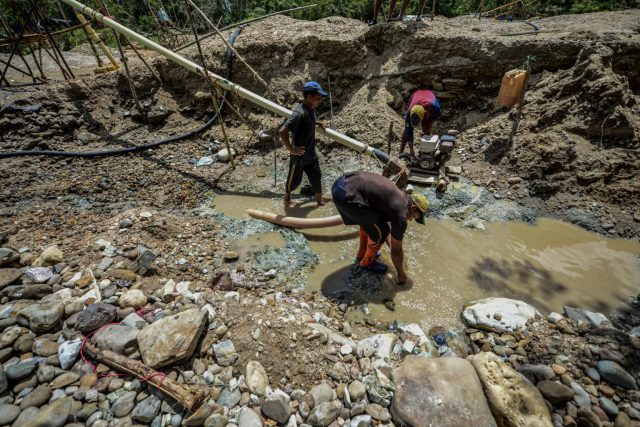
On January 9, the Monitoring of the Andean Amazon Project (MAAP), of U.S.-based nongovernmental organization (NGO) Amazon Conservation, said that according to satellite images more than 750 hectares of the Yacapana National Park in the Venezuelan Amazon had been deforested between 2021 and 2022 — all for illegal gold mining operations.
By Dialogo Américas – Julieta Pelcastre
Mar 16, 2023
“It [the regime] can hardly say that it doesn’t realize that so many hectares have been destroyed, that this is not happening,” Emiliano Terán, a researcher at the Center for Development Studies of the Central University of Venezuela, told Diálogo on February 5. “This rather worrisome pattern comes hand in hand with the strengthening of illicit economies.”
All kinds of illegal activities are being carried out in the national park due to the increased presence of armed groups, who trade arms, ammunition, food, fuel, and drugs in the area, while also conducting human trafficking, Venezuelan NGO Control Ciudadano indicated in a January 11 report. Meanwhile the regime “and its military forces remain silent,” the report said.
MAAP’s estimations saw “an accumulated mining deforestation of 1,537 hectares within the Yacapana mountain sector; almost half [49 percent] of which occurred in the last two years. Of the total accumulated deforestation, 17 hectares have occurred at the top of the ‘sacred tepuy’ [table-top mountain].”
The National Liberation Army (ELN), dissidents of the Revolutionary Armed Forces of Colombia (FARC), and the Bolivarian National Guard (GNB) have been extracting gold from this national park, according to a Colombian Army report environmental news site Mongabay had access to.
GNB members weekly go to collect bribes in gold and money. With these transactions, the exploitation of the metal continues smoothly, Mongabay reported. According to Venezuelan organization SOS Orinoco, the size of the illegal mining operations can be comparable to 1,884 soccer fields.
The analysis of high-resolution satellite images has allowed SOS Orinoco and Amazon Conservation to identify 8,000 mining camps or machinery in the lowlands of the national park, and 425 more camps or machinery in the upper part of the mountain, The Washington Post reported.
The Nicolás Maduro regime has been benefitting from illegal mining, receiving kickbacks and other illicit profits that serve as lifelines for Maduro. Internationally, Maduro’s gold mining operations have allowed the regime to strengthen alliances with other corrupt governments to jointly evade international sanctions, Washington, D.C.-based think tank Freedom House indicated in a late 2020 report.
Implications
The environmental, social, and cultural implications of gold mining in Venezuela are complex and of great magnitude, said the organization Observatory of Political Ecology of Venezuela. Venezuela’s illegal mining is an example of “predatory extractivism,” according to the organization.
Some of the consequences of the increase in illegal gold mining operations are the forced displacement of indigenous peoples, murders and disappearances, cases of modern slavery, destruction of ecosystems, contamination of rivers with mercury, and dynamics of dispossession and territorial fragmentation, the Observatory indicated.
“It also impacts the traditional ways of life of indigenous peoples. One example is the creation of organized indigenous guards to protect their territories with their own means,” Terán said. “Because of their structure, the guards are caught in violent situations because the criminal groups don’t like that idea.”
The main factors that create a fertile ground to worsen illegal gold mining operations are the price of gold, the migration of criminal groups, corruption, the collapse of oil revenue, and their effects on indigenous communities.
“In Venezuela corruption has increased to a point not only qualitative, but quantitative. A totally uninhibited corruption that creates new fiefdoms of [gold] extraction,” Terán said. “Yacapana is in essence what is happening throughout the Venezuelan Amazon.”
Dialogue
“To arrive at radical solutions, we must not seek ecological ideals, but survival itself,” Terán continued. “We need to undo this regime where there is absolutely no democratic framework, to try to go to one where there is dialogue with society and certain guidelines can be respected for the continued existence of life in the country and the planet.”
The Venezuelan Amazon needs for international institutions to understand the importance of precautionary measures and protection for indigenous communities, because the situation of vulnerability is very high for them, as well as for citizens to be informed and aware of illegal gold mining and climate change problems, Terán concluded.
…
Read More: Dialogo Américas – Illegal Gold Mining Operations in Venezuelan Amazon on the Rise
…

